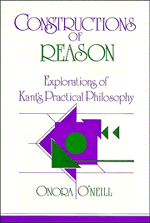Book contents
- Frontmatter
- Contents
- Preface
- List of abbreviations
- Part I Reason and critique
- 1 Reason and politics in the Kantian enterprise
- 2 The public use of reason
- 3 Reason and autonomy in Grundlegung III
- 4 Action, anthropology and autonomy
- Part II Maxims and obligations
- Part III Kant's ethics and Kantian ethics
- References
- Index
3 - Reason and autonomy in Grundlegung III
Published online by Cambridge University Press: 05 June 2012
- Frontmatter
- Contents
- Preface
- List of abbreviations
- Part I Reason and critique
- 1 Reason and politics in the Kantian enterprise
- 2 The public use of reason
- 3 Reason and autonomy in Grundlegung III
- 4 Action, anthropology and autonomy
- Part II Maxims and obligations
- Part III Kant's ethics and Kantian ethics
- References
- Index
Summary
Much of the difficulty of Kant's Grundlegung arises from shifts of framework within each chapter. The third chapter shifts from a metaphysic of morals to a critique of pure practical reason. This complicated shift is hardly discussed in the text, yet it is the crux of the chapter. In this essay I draw on other Kantian texts, in particular on the Critique of Pure Reason, to elucidate the point and outcome of the shift of framework. Much that I shall say is tentative: a proposal for reading the chapter rather than detailed commentary. I shall try to make it definite enough for criticism to have points of focus.
In the preface to Grundlegung we are told that “a metaphysic of morals has to investigate the Idea and principles of a possible pure will” rather than “the activities and conditions of human willing as such” (G, IV, 390). For much of Chapter II and in Chapter III up to page 450, Kant stays within the framework of a metaphysic of morals. He presents the Categorical Imperative and analyzes the connection between freedom and morality in abstraction from claims about actual rational beings. Even if it convinces, we will still be unsure about human rationality, human freedom or human duties. No doubt we will share the common rational understanding of morality of Chapter I; but Kant will not have vindicated this common understanding.
- Type
- Chapter
- Information
- Constructions of ReasonExplorations of Kant's Practical Philosophy, pp. 51 - 65Publisher: Cambridge University PressPrint publication year: 1990
- 1
- Cited by



